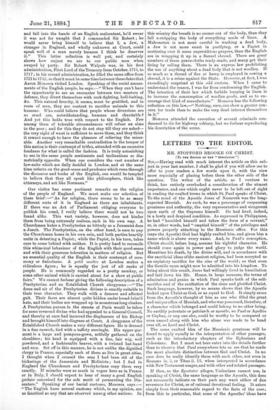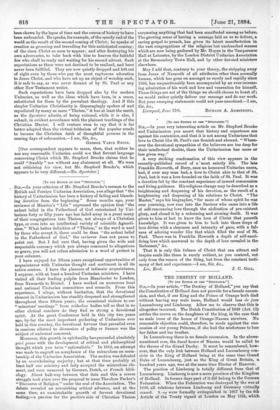LETTERS TO THE EDITOR.
MR. STOPFORD BROOKE ON CHRIST.
ITo TER EDITOR OF TER " SPECTATOR:1
Sin,—Having read with much interest the article on this sub- ject in your last number, I shall be glad if you will allow me to offer to your readers a few words upon it, with the view more especially of placing before them the other side of the question. The writer of the article, as I venture to think, has entirely overlooked a consideration of the utmost importance, and one which ought never to be left out of sight in reading the exalted terms in which St. Paul speaks of Christ. To the mind of the Apostle Jesus of Nazareth was the long- expected Messiah. As such, he was a personage of surpassing greatness and authority, the very representative and vicegerent upon earth of the Supreme himself. He had lived, indeed, in a lowly and despised condition. As expressed in Philippians, he had " humbled himself and taken the form of a servant," or, in other words, had " emptied himself " of the privileges and powers properly attaching to the Messianic office. For this (says the Apostle) God had highly exalted him, and given him a name which is above every name. And, in Paul's conception, Christ should, before long, assume his rightful character. He should come again in power and glory to judge the world. Meantime his death, by the divine will, and in accordance with the sacrificial ideas of the ancient religion, had been accepted as an expiatory sacrifice for the sins of the world ; so that even the Gentile races might now be admitted into his kingdom. To bring about this result, Jesus bad willingly lived in humiliation and laid down his life. Hence, in large measure, the terms of admiration and praise in which Paul speaks both of the self- sacrifice and of the exultation of the risen and glorified Christ. Such language, however, by no means shows that the Apostle looked upon Christ as God, or as equal to God. It simply arose from the Apostle's thought of him as one who filled the great and unique office of Messiah, and who was possessed, therefore, of a character which belonged and could belong to no other being. No earthly potentate or patriarch or apostle, no Paul or Apollos or Cephas, or any one else, could be worthy to be compared or even named along with him who alone was made to be head over all, as Lord and Christ.
The same exalted idea of the Messianic greatness will be found to apply equally to the interpretation of other passages, such as the introductory chapters of the Ephesians and Colossians. But I must not here enter into the details further than to observe that Paul everywhere lets us see that he made the most absolute distinction between God and Christ. In no case does he really identify them with each other, not even in Romans ix. 5, or Titus ii. 13, when interpreted in accordance with New Testament usages, and with other and related passages.
If then, as the Spectator alleges, Unitarians cannot use, in speaking of Christ, the same language as the Apostle, this does not necessarily indicate on their part any want either of due reverence for Christ, or of rational devotional feeling. It arises simply from their reasonable regard to the facts of the case; from this in particular, that some of the Apostles' ideas have been shown by the lapse of time and the course of history to have been unfounded. He speaks, for example, of the speedy end of the world as the result of the second coming of Christ ; he speaks of creation as groaning and travailing for this anticipated coming ; of the risen Christ as soon to appear ; and after destroying his own adversaries, to take back with him to heaven the faithful few who shall be ready and waiting for his second advent. Such expectations as these were not destined to be realised, and have never been fulfilled. They are now quietly dropped and left out of sight even by those who pay the most rapturous adoration to Jesus Christ, and who have set np an object of worship such, it is safe to say, as was never dreamt of by St. Paul or any other New Testament writer.
Such expectations have been dropped also by the modern Unitarian, as well as the ideas which have been, in a sense, substituted for them by the prevalent theology. And if this simpler Unitarian Christianity is disparagingly spoken of and repudiated by many as mere " Theism," it has at least the merit, as the Spectator admits, of being rational, while it is also, I submit, in evident accordance with the plainest teachings of the Christian Master. I will venture even to say that it is far better adapted than the virtual tritheism of the popular creeds to become the Christian faith of thoughtful persons in the coming days of reformation.—I am, Sir, &c.,
GEORGE VANCE SMITH.
[Our correspondent appears to mean, then, that neither he nor any reasonable Unitarian could use that fervent language concerning Christ which Mr. Stopford Brooke claims that he could "frankly " use without any abatement at all. We were not criticising hie view, but Mr. Stopford Brooke's, which appears to be very different.—En. Spectator.]



































 Previous page
Previous page